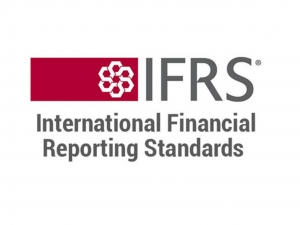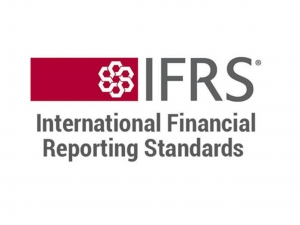عرض العناصر حسب علامة : التقارير المالية
مجلس معايير المحاسبة الدولية ينشر مقترحات لتحديث معياره المحاسبي للمنشآت الصغيرة والمتوسطة
نشر مجلس معايير المحاسبة الدولية التابع لمؤسسة المعايير الدولية لإعداد التقارير المالية مقترحات لتحديث المعيار الدولي لإعداد التقارير المالية الخاص بالمنشآت الصغيرة والمتوسطة ليعكس التحسينات التي أدخلت على جميع المعايير، مع الحفاظ على ملاءمة المعيار لتلك المنشآت.
تحديث IFRIC سبتمبر 2022
تحديث IFRIC هو ملخص للقرارات التي توصلت إليها لجنة تفسيرات المعايير الدولية لإعداد التقارير المالية (اللجنة) في اجتماعاتها العامة. يمكن العثور على التحديثات السابقة في أرشيف تحديث IFRIC.
رسالة دكتوراه: دراسة تحليلية لمدى التزام شركات مؤشر الاستدامة المصري بإطار المجلس الدولي للتقارير المتكاملة ودوره في ترشيد قرارات المستثمرين
تهدف هذه الدراسة الى "تقييم أثر التزام الشرکات بکل من اطار المجلس الدولي للتقارير المتکاملة (international integrated reporting council) وارشادات المبادرة العالمية للتقارير (Global Reporting Intiative –G4) على قرارات المستثمرين.
رسالة دكتوراه: الاستراتيجيات المحاسبية الرائدة لدرء المخاطر البيئية كركيزة أساسية لتحقيق التنمية المستدامة
يستهدف البحث بشکل رئيسي تقييم کفاءة وفاعلية استراتيجية مصر 2030 بشأن مقومات تفعبل التنمية المستدامة وذلک من خلال الکشف عن طبيعة وأهمية المخاطر البيئية التي تواجه المجتمع المصري (موارد مائية – مخلفات صلبة – تنوع بيولوجي).
رسالة دكتوراه: نموذج مقترح للقياس والإفصاح المحاسبي عن اختبارات تحمل الضغوط كأداة لإدارة المخاطر المصرفية
استهدفت الدراسة تقديم نموذج محاسبي مقترح للقياس والافصاح المحاسبي عن اختبارات تحمل الضغوط کأداة فعالة لإدارة وضبط المخاطر المصرفية بما يتواءم مع طبيعة بيئة عمل البنوك التجارية المصرية في ظل تداعيات الأزمة المالية العالمية والمحلية.
رسالة ماجستير: تطور دور وظيفة التدقيق في مجال حوكمة الشركات لتجسيد مبادىء ومعايير التنمية المستدامة
أصبح التطور السريع والمستمر في شتى المجالات هو السمة الغالبة في هذا العصر، وعلى الرغم من أن الهدف من هذه التطورات ودوافعها يأتي استجابة لتلبية احتياجات الإنسان المتزايدة، فإنها خلفت أثاراً سلبية واضحة على النواحي الاجتماعية والبيئية
يسعى مجلس معايير المحاسبة المالية للحصول على مدخلات حول الفصل الجديد المقترح من الإطار المفاهيمي
مجلس معايير المحاسبة المالية يصدر فصلاً جديدًا مقترحًا لإطاره المفاهيمي يصف الكيان المسؤول عن إعداد التقارير.
معلومات إضافية
-
المحتوى بالإنجليزية
FASB seeks input on proposed new chapter of conceptual framework
FASB has issued a proposed new chapter for its Conceptual Framework that describes a reporting entity.
The proposed chapter would become Chapter 2 of FASB Concepts Statement No. 8, Conceptual Framework for Financial Reporting. The Conceptual Framework is a body of interrelated objectives and fundamentals that provides FASB with a tool as it sets standards. A Statement of Financial Accounting Concepts is nonauthoritative and does not establish or change generally accepted accounting principles.
The new chapter, according to a FASB release, would be similar to the rest of the framework in that it establishes concepts that the board would use in developing standards of financial accounting and reporting. It would provide the board with "a framework for developing standards that meet the objective of financial reporting and enhance the understandability of information for existing and potential investors, lenders, donors, and other resource providers of a reporting entity."
Stakeholders are asked to provide input on the characteristics of a reporting entity described in the proposed chapter. This includes a description of a reporting entity as "a circumscribed area of economic activities that can be represented by general purpose financial reports that are useful to existing and potential investors, lenders, and other resource providers in making decisions about providing resources to the entity."
It also describes the three features of a reporting entity:
Economic activities of the entity have been conducted.
Those economic activities can be distinguished from those of other entities.
The financial information in general-purpose financial reporting faithfully represents the economic activities of the entity in the circumscribed area and is useful in making decisions about providing resources to the entity.
رسالة ماجستير: محددات التحول إلى تطبيق المعايير الدولية للتقارير المالية IFRS في العراق وأثرها على تحديد وعاء الضريبة على الدخل
هدفت هذه الدراسة إلى تحديد مدى تطبيق المعايير الدولية للتقارير المالية في رفع مصداقية البيانات المالية للمؤسسات الاقتصادية ورفع مستوى الشفافية في الإفصاح، ولتحقيق ذلك تم تصميم نموذج مقترح للدراسة لكي يستخدم كدليل لاختبار العلاقة بين متغيرات الدراسة.
رسالة ماجستير: دور مؤشرات بيئة الأعمال في تحديد مستوى الإقبال على تبني معايير التقارير المالية الدولية
هدفت هذه الدراسة إلى اختبار تاثير مؤشرات بيئة الأعمال معبراً عنها بالمؤشرات القانونية والاقتصادية في تحديد مستوى الإقبال على تبني معايير IFRS في عينة من دول الشرق الأوسط للفترة ما بين 2001 - 2010.
ورشة عمل عبر الإنترنت حول إعداد التقارير المالية الرقمية
انضم إلى ورشة عمل عبر الإنترنت تستكشف القضايا المتعلقة بإعداد التقارير المالية الرقمية ورقمنة التقارير المالية.
معلومات إضافية
- البلد عالمي
- نوع الفعالية مجانا
- بداية الفعالية الجمعة, 18 نوفمبر 2022
- نهاية الفعالية الجمعة, 18 نوفمبر 2022
- التخصص محاسبة ومراجعة
- مكان الفعالية اونلاين










